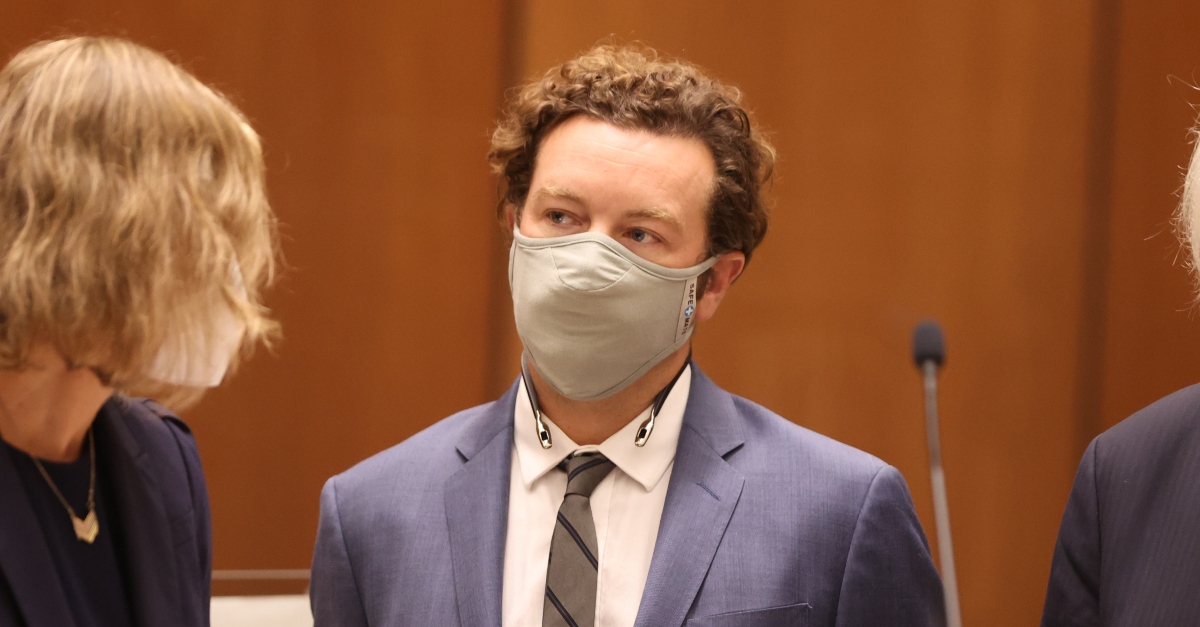
Danny Masterson (Photo via Lucy Nicholson – Pool_Getty Images)
Actor Danny Masterson asked a judge to dismiss the rape charges filed against him, arguing that it’s “not a fluke” that the first case ended in a mistrial after a jury deadlocked.
Los Angeles Superior Court Judge Charlaine F. Olmedo in November declared a mistrial in the case after jurors were unable to agree on any of the three rape charges following a four-week trial. Jurors revealed a split that favored acquittal on each charge, with the votes tallying 10 to two, eight to four, and seven to five, respectively, for each count.
With a new trial looming in the coming months, Materson’s attorney Philip Kent Cohen urged the court to exercise its discretion and dismiss the prosecution’s case against his client “in the interest of justice,” arguing that there was “no reason to believe a retrial will produce a different outcome.”
“Fourteen different people heard and deliberated on the evidence, and large number concluded that Masterson should be acquitted of all charges,” Cohen wrote in the filing. “This outcome was not a fluke. The jury’s deliberative process was appropriate, independent and thoughtful, and no jurors were unreasonable in how they approached their task.”
Cohen also emphasized that a new trial would not change the material evidence against Masterson, which some in the jury already found unconvincing.
“The jury focused on the most relevant evidence — the testimony and prior statements of the Jane Does — and a strong majority reasonably concluded that this critical evidence established reasonable doubt,” he wrote. “The contradictory nature of their testimony is not going to credibly change. Indeed, to the extent it was to change at any subsequent trial, that ‘change’ would provide yet more fodder for inconsistencies, contradictions, and impeachment.”
All three of the alleged victims said they met Masterson through the Church of Scientology and claimed he drugged them and raped them in his room while they were nearly unconscious. One of the women was Masterson’s long-term girlfriend while the other were casual acquaintances.
Cohen specifically pointed to an interview with the jury foreman shortly after the judge declared the jury “hopelessly deadlocked,” saying it gave every indication that all members of the jury approached their task in earnest and came to their conclusions through diligent deliberations.
“The insight provided by the foreperson during this interview confirms what the post-trial discussions of the jurors with all counsel had indicated — that this was a conscientious, thoughtful, and deliberate jury which took is job and its individual opinions with all seriousness, and its vote totals resulted from such seriousness rather than from any bullying or browbeating from one or two of its members,” the filing states. “And, as a review of the foreperson’s interview reflects, the way in which these deliberations were conducted (deliberations which ultimately consisted of 14 independent and voting jurors) supports exactly what the vote tally reflects – the likelihood of conviction on any charges at a retrial is low.”
Two of the jurors who participated in the 2 1/2 days of deliberations prior to breaking for Thanksgiving were replaced by alternates after testing positive for COVID upon their return. The original jury had told the judge they were unable to reach a decision on the three charges just before the holiday break, but Judge Olmedo told them they had not deliberated long enough to consider all of the relevant evidence presented during the trial.
Following the interviews with outgoing jurors in December, Deputy District Attorneys Reinhold Mueller and Ariel Anson said they were unsurprised by what they had to say.
“It’s what we all thought: That some people believed the victims and some didn’t,” Anson said. “Nothing completely shocking was said by the jurors.”
The Los Angeles County District Attorney’s Office did not immediately respond to a request for comment on a retrial from Law&Crime.
In concluding his argument, Cohen again returned to the jury foreperson and their analysis of the case against Masterson.
“After leading the lengthy deliberations, the jury foreperson formed the opinion that no jury is likely ever render unanimous guilty verdicts. He is correct.”
Law&Crime’s Adam Klasfeld contributed to this report.
Read the full filing below.